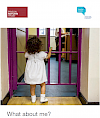UK: Prison Reform Trust publishes ‘What about me?’
9th July 2018

The Prison Reform Trust (PRT) has released a report titled “What About Me? The impact on children when mothers are involved in the criminal justice system”. This report aims to highlight the impacts imprisonment of a primary household member has on a family home- it being one of ten adverse childhood experiences, leading to severe impact on long-term health and wellbeing.
The report found the following:
- Approximately 60% of women in prison had children under the age of 18, many of which are at risk of being "forgotten by the state" once the mother becomes incarcerated.
- Although grandparents commonly take the primary role of caregiver, they are rarely shown support or consultation.
- As women are more likely than men to be sole or primary caregiver, maternal imprisonment may often mean the complete loss of paternal care, and the break-up of a family.
- Children living with grandparents are more likely to feel isolated and confused, due to the difference in age of their carer’s compared to other children’s parents, as well as the grandparents experiencing financial worries and the physical and emotional limitations of becoming primary caregiver for a grandchild.
- Both mother and child are subject to a severe amount of stigma, shame and negative media treatment, more than if the parent imprisoned was the father instead of the mother.
- There are a significant number of women incarcerated in situations where alternatives to custody may be more beneficial to mother, child and society.
In order to encourage development and reform in this area, the report mentions a number of recommendations, as well as developments ongoing currently, which would end the stigma and ensure change is made for children of prisoners.
Some key recommendations and developments mentioned are noted:
- Children of Prisoners Europe (COPE) are currently in support of developing and implementing a memorandum of understanding in regards to the protection of the basic rights of children.
- UK Government should establish a framework for identifying and safeguarding children, and ensuring their needs are identified and addressed.
- Children of prisoners should be included as a vulnerable group for strategic planning.
- There should be more emphasis on training of practitioners, such as police, social workers, prison staff and teachers, to ensure children were receiving the correct support and information they need to understand they are not alone in their situation.
- Schools must ensure their staff are aware and trained in how to deal with issues around paternal imprisonment, and are able to provide the correct support when necessary.
- In order to reduce stigma, media organisations should aim to develop a code of conduct where children in these situations are protected instead of stigmatised.
- Where possible, visits between mother and child should be made as private and safe as possible- a place where children’s visits are a right of the child rather than a privilege for the mother.
- Women with dependent children should be diverted from custody as much as possible.
The report concludes that while the children of prisoners are often left isolated, confused and negatively impacted throughout their lives, there are ways in which these long-term impacts may be deterred.
The full report may be read here.
See more:
- World Female Imprisonment List here.




